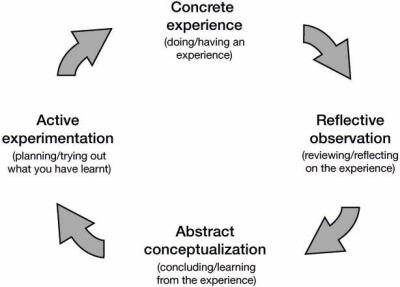The idea that people learn in different ways has been explored over the last few decades, by many researchers. Kolb is one of the most influential of these. His experiential learning cycle is recognized as being one of the cornerstones of understanding how individuals learn effectively. With his colleagues, he found that individuals begin with their preferred style in the experiential learning cycle (see Figure 1). Participants can easily become bored if the training approaches used during the session only tap into one learning style. Kolb’s research found that people learn in four ways, with the likelihood that they will develop one mode of learning more than another. As shown in the experiential learning cycle model, learning occurs through four key areas:
- concrete experience (doing);
- observation and reflection (reviewing);
- abstract conceptualization (concluding);
- active experimentation (planning).
This cycle suggests that there are four stages, which follow from each other. Concrete Experience, which is having an experience, is followed by a personal Reflection on that experience, or time to think about what just happened. This may then be followed by learning from the experience, or the application of known theories to it – Abstract Conceptualization. This then leads to the construction of ways of modifying the next occurrence of the experience, Active Experimentation; leading in turn to the next Concrete Experience. All this may happen in a flash or over days, weeks or months, depending on the topic, and there may be a ‘wheels within wheels’ process at the same time.
The four stages in the cycle are mutually dependent and in your role as trainer you can benefit by building time for each of the four elements into your training programme. Essentially, good learning design should ensure that each learning activity has i) an experience of some kind, ii) time for facilitated reflection, iii) time for facilitated conclusion and, iv) an opportunity to plan the use of the experience in practice.


No comments:
Post a Comment